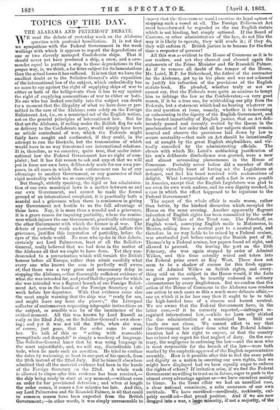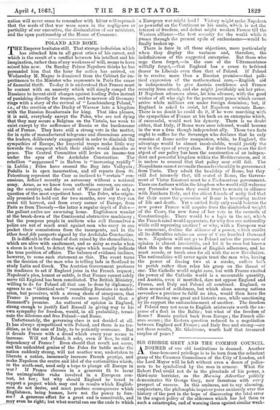TOPICS OF THE DAY.
THE ALABAMA AND PETERHOFF DEBATE.
WE read the debate of yesterday week on the Alabama question with profound humiliation. It is not that we sympathize with the Federal Government in the weak wailings with which it appears to regard the depredations of one or two cleverly managed Confederate ships. That it should never yet, have produced a ship, a crew, and a com- mander equal to putting a stop to those depredations in the proper way, is, we think, a far fitter subject for its lamentations than the actual losses it has suffered. It is not that we have the smallest doubt as to the Solicitor-General's able exposition of the international law of the subject, which undoubtedly has no more to say against the right of supplying ships of war to either or both of the belligerents than it has to say against the right of supplying ammunitions of war to either or both. No one who has looked carefully into the subject can doubt for a moment that the illegality of what we have done or per- mitted in the case of the Alabama rests solely on the Foreign Enlistment Act, i.e., on a municipal act of the English nation, not on the general principles of international law. But for that act the Alabama, if sailing under the British flag for sale or delivery to the Confederate navy, would simply have been an article contraband of war, which the Federals might fairly have caught and confiscated, if they could, in the attempt to run the blockade, but the transmission of which would have in no way threatened our international relations. It is, therefore, as we conceive, quite true, that under inter- national law the Federal Government has no right of com- plaint; but it has fair reason to ask and expect that we will put in force our own laws, deliberately made for our own pur- poses, in all cases in which their enforcement can be of any advantage to another Government, or any guarantee of that rigid neutrality which we so earnestly profess.
But though, strictly speaking, the rigid or lax administra- tion of our own municipal laws is a matter between us and our own Government, and cannot be made the formal ground of an international complaint, it is practically both a scandal and a grievance when there is remissness in giving any Government not hostile to us the full advantage of those laws. Nay, it is more than a scandal and a grievance, it is a grave reason for imputing partiality, where the remiss- ness which injures the one Government, practically advantages the other Government with which the former is at war. The debate of yesterday week sustains this scandal, inflicts this grievance, justifies this imputation of partiality, before the eyes of the whole world. No man who spoke in that debate, certainly not Lord Palmerston, least of all the Solicitcr- General, really believed that we had done in the matter of the Alabama all that we ought to have done. Yet they con- descended to a prevarication which will tarnish the British honour before all Europe, rather than admit candidly what every one who knows the ease is perfectly well aware of, that there was a very gross and unnecessary delay in stopping the Alabama,—that thoroughly sufficient evidence of what she was intended for, and proof that the purpose for which she was intended was a flagrant breach of our Foreign Enlist- ment Act, was in the hands of the Foreign Secretary a full week before her departure. With that evidence came also the most ample warning that the ship was "ready for sea, and might leave any hour she pleases," the Liverpool collector of customs even requesting telegraphic instructions on the subject, so sensible was he of the imminence of the critical moment. All this was known by Lord Russell as early as the 22nd July, on the Solicitor. General's own show- ing; and yet it was not till the 29th, when she was, of course, just gone, that the order came to arrest
her. To talk of this as "acting with reasonable promptitude and despatch" is simply a mockery of language. The Solicitor-General knew that he was using language in the most unjustifiable, and, we will say, discreditable lati- tude, when he made such an assertion. He tried to confuse the dates by reckoning, at least in one part of his speech, from the 26th instead of the 22nd July. But he himself elsewhere admitted that all the material evidence had been in the hands of the Foreign Secretary on the 22nd. A whole week is allowed to elapse after this evidence has been received,— the ship being ready to start at any moment,—without even an order for her provisional detention ; and when at length the order comes, it comes a few minutes too late. And this, say Lord Palmerston and Sir Bounden Palmer, is all that could in common reason have been expected from the British Government ;--in other words, it was simply unreasonable to
expect that the Government would exercise its legal option of stopping such a vessel at all. The Foreign Enlist ment Act must henceforward be regarded as the one English statute which is not binding, but simply optional. If the Board of Customs, or other administrators of the law, do not like the way it is likely to operate, they will evade it ; if they do, they will enforce it. British justice is to become for the first time a respecter of persons!
All this was co evident to the House of Commons as it is to our readers, and yet they cheered and cheered again the statements of the Prime Minister and Sir Roundell Palmer. As if to remove all doubt of the temper of the House, Mr. Laird, M.P. for Birkenhead, the father of the contractor for the Alabama, got up in his place and was not ashamed to justify his infraction of the provisions of the English statute-book. He pleaded, whether truly or not we cannot say, that the Federals were quite as anxious to tempt him to infringe the law as the Confederates;—a very good reason, if it be a true one, for withholding our pity from the Federals, but a statement which had no-bearing whatever on the real question at issue, namely, whether it is becoming or unbecoming to the dignity of the English Government, and the boasted impartiality of English justice, that an Act deli- berately passed and recently recited by the Queen in the proclamation of her order that all her subjects should remain neutral and observe the provisions laid down by law to secure neutrality—that such an Act should be intentionally set at nought by the great English shipbuilders, and vir- tually cancelled by the administrating officials. The cheers with which Mr. Laird's unblushing justification of his son's deliberate disobedience was greeted, were a new and almost astounding phenomenon in the House of Commons. Probably never before did a member of that assembly virtually boast of having set the Legislature at defiance, and find his boast received with acclamations of delight. What interpretation of such a fact is even possible in America, except that the English Legislature was glad to see even its own work undone, and its own dignity mocked, in a case in which the effect happened to be injurious to the Federal Government ?
The aspect of the whole affair is made worse, rather than better, by the kindred discussion which occupied the House on the same evening. Another apparently flagrant infraction of English rights has been committed by the order of Admiral Wilkes of the Trent ease. The Peterhoff, an English vessel, conveying English mails to Matamoras, in Mexico, sailing from a neutral port to a neutral port, and therefore in no way liable to be seized by a Federal cruiser, was overhauled just before entering the Danish port of St. Thomas's by a Federal cruiser, her papers found all right, and allowed to proceed. On leaving the part on the 25th February, she was again stopped by order of Admiral Wilkes, and this time actually seized and taken into the Federal prize court at Key West. There does not seem to be a shadow of excuse for this fresh aggres- sion of Admiral Wilkes on British rights, and every- thing said on the subject in the House would, if the facts as given prove correct, be heartily endorsed in ordinary circumstances by every Englishman. But we confess that the action of the House of Commons in the Alabama case renders our action in such cases as this a much more delicate affair — one on which it is far less easy than it ought to be to take the high-handed tone of a sincere and honest neutral. We are aware that the Federal Government have, in the latter case,—if it be correctly reporter1,—infringed re- cognized international law, —while we have only shirked the due administration of a municipal law. Still our hands are not clean. We cannot affect to say that the Government has either done what the Federal Admin- istration had a fair right to expect, or that the country has evinced any regret for that neglect of duty. On the con- trary, the negligence in enforcing the law—and the man who is most responsible for the breach of the law—were both marked by the emphatic approval of the English representative assembly. How is it possible after this to feel the same pride and dignity as a nation in asserting our own rights, that we might have displayed had we been equally eager to enforce the rights of others? If irritation arise, if we find the Federal Government Unwilling to trust us in future, eager to push to the utmost every advantage against us—we have ourselves mainly to blame. In the Trent offair we had an unsullied case, a clear national conscience, a calm assurance of our own rectitude. We have sacrificed-e-neecllessly, recklessly, cul- pably sacrificed—that proud position. And if we are now dragged into a war, a le minority, if not a majority, of the
nation will never cease to remember with bitter self-reproach that the seeds of that war were sown in the negligence or partiality of our exebutive, the dissimulation of our ministers, and the open partizanship of the House of Commons.































 Previous page
Previous page